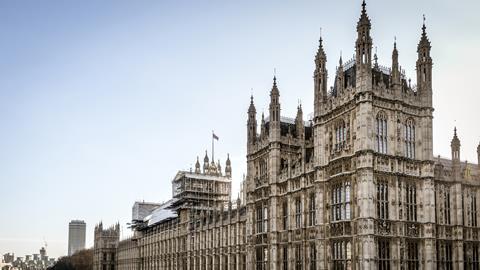The Litigation Funding Agreements (Enforceability) Bill received a relatively smooth ride yesterday as it was debated in parliament for the first time.
Issues under debate during the bill’s second reading in the House of Lords included the retrospective nature of the bill, the Civil Justice Council’s (CJC) forthcoming review of litigation funding, and the need to improve regulations on damages-based agreements (DBAs).
Introducing the bill, the advocate general for Scotland Lord Stewart (Keith Stewart KC) said there was an urgent need to restore the funding position to what it had been before the Supreme Court’s ruling in PACCAR Inc & Ors v Competition Appeal Tribunal & Ors. He said: ‘By rendering many existing [litigation funding agreements] unenforceable, the position post-judgment risks undesirable satellite litigation, an increased burden on the courts, and creating an unfavourable market for litigation funding, which, in turn, threatens access to justice.’
Addressing concerns over the retrospective nature of the bill, he added: ‘The legality and propriety of the proposed retrospection, including its compatibility with the European Convention on Human Rights, has been considered carefully.
‘If the bill were prospective only, there would be uncertainty as to the enforceability of agreements entered into before the PACCAR judgment but where the claim is concluded after the act comes into force. This could lead to undesirable satellite litigation, which would benefit no one,' he said.
‘Retrospective effect will also ensure that the contractual rights and obligations agreed under LFAs entered into before the Supreme Court’s judgment continue to have effect as intended. Early commencement will minimise the period of retrospection. These provisions will remove any uncertainty about the enforceability of LFAs in cases that have settled and enable litigation funders to continue to fund cases, including existing cases.’
During the debate, Labour peer Lord Ponsonby (Frederick Ponsonby) added: ‘We recognise the gravity of retrospective legislation, but without it there is no way to preserve all the agreements in cases that have now been concluded. The briefings I have received say that there is no actual problem here, because all live agreements can be renegotiated. However, it is the older agreements that would stand to damage the industry most, hence the need for the bill.’
However, Liberal Democrat peer Lord Marks (Jonathan Marks KC) said ‘the whole issue of retrospectivity and its effect’ would need to be carefully considered at committee stage.
Lord Stewart also confirmed that the CJC will soon be publishing the terms of reference for its review of the third-party litigation funding market England and Wales, which will include issues such as the need for greater safeguards for claimants, regulation of the sector and the possibility of caps on the returns made to funders. An interim report is due by this summer, with a final report by the summer of 2025.
While several peers spoke in favour of the need for a review of the litigation funding sector, Labour peer Lord Mendelsohn (Jonathan Mendelsohn) questioned whether the CJC was the right body to carry this out. The review 'is about the development of an economic market with economic activity, actors and consequences', he said. 'This is currently outside its scope, which I am keen should be extended.’
Crossbench peer Lord Carlile (Alex Carlile KC) added: ‘My view is to welcome the CJC inquiry very strongly and that we should be prepared, if absolutely necessary, to provide statutory legislation for litigation funders - though I suspect from what I have seen that they will be willing to move voluntarily to a proper level of regulation, which is in some ways much better than statutory legislation because it is much more flexible.’
Meanwhile several peers pressed the government to take action in relation to DBAs, which are currently governed by the DBA Regulations 2013. In 2019 a new set of draft regulations was drawn up by barrister Nick Bacon KC and Professor Rachael Mulheron of Queen Mary University. However, despite the draft regulations being well received by the profession, the government took no action to bring them into force.
In response, Lord Stewart said government would ‘consider the timetable’ to improve the DBA regulations ‘without encouraging unnecessary litigation’. He noted that any revisions would be subject to a statutory consultation.
In closing the debate, Lord Stewart thanked peers for their broad support but noted that the draft legislation had not received a ‘blank cheque’. It will now be scrutinised by a committee of the whole house.
This article is now closed for comment.
































7 Readers' comments